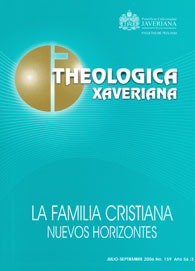Abstract
Asumiendo la propuesta de Javier Garrido en su libro Proceso humano y gracia de Dios (1996), el presente artículo enfatiza en puntos clave que permiten entender la realidad matrimonial como un proceso de personalización de los cónyuges y de resignificación de las crisis personales y, por ende, de la pareja, que les facilite la transformación de las mismas en oportunidades de consolidación de la vida matrimonial y familiar. Así se llega a la esencia fundante del carácter sacramental del vínculo matrimonial. El proceso vital de cada persona va girando en su manera de pensar y actuar, humana y espiritualmente, y es clave para el logro de la autenticidad y realización humanas. Cada ser humano contiene en su interior diferentes perspectivas, desde donde se ubica frente al mundo y, a su vez, desde donde superar diferentes momentos de crisis o coyunturas que le permiten humanizarse y humanizar dependiendo de la forma como las asuma. Con esta propuesta de transformación buscamos que el hombre y la mujer ingresen en un proceso paulatino de asumir la realidad de su vida, tal y como es, para crecer en libertad y coherencia entre lo que piensa, siente y desea.This journal is registered under a Creative Commons Attribution 4.0 International Public License. Thus, this work may be reproduced, distributed, and publicly shared in digital format, as long as the names of the authors and Pontificia Universidad Javeriana are acknowledged. Others are allowed to quote, adapt, transform, auto-archive, republish, and create based on this material, for any purpose (even commercial ones), provided the authorship is duly acknowledged, a link to the original work is provided, and it is specified if changes have been made. Pontificia Universidad Javeriana does not hold the rights of published works and the authors are solely responsible for the contents of their works; they keep the moral, intellectual, privacy, and publicity rights.
Approving the intervention of the work (review, copy-editing, translation, layout) and the following outreach, are granted through an use license and not through an assignment of rights. This means the journal and Pontificia Universidad Javeriana cannot be held responsible for any ethical malpractice by the authors. As a consequence of the protection granted by the use license, the journal is not required to publish recantations or modify information already published, unless the errata stems from the editorial management process. Publishing contents in this journal does not generate royalties for contributors.


